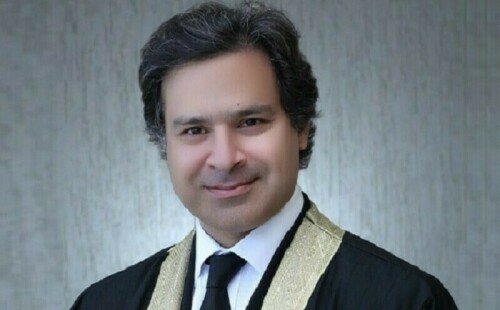ISLAMABAD, Nov 21: Defending President Pervez Musharraf’s proclamation of the state of emergency, senior counsel Sharifuddin Pirzada argued before the Supreme Court on Wednesday that the court’s short order restoring deposed Chief Justice Iftikhar Mohammad Chaudhry in July had lost its efficacy because the detailed verdict was not issued within three months.
The validation of Nov 3 emergency by Gen Musharraf was one of the pleadings of the counsel who advised the court to confer all powers to the army as it had done in the 2000 Zafar Ali Shah case.
Petitioner Barrister Zafarullah Khan of the Watan Party and president’s counsel Sharifuddin Pirzada concluded their arguments on Wednesday. Attorney General Malik Muhammad Qayyum was to start his arguments when the court time was over.
“We have the highest regard for the judiciary because we believe in its independence and hold the judges in highest esteem, but some orders were passed which render the Supreme Judicial Council (SJC) ineffective,” Mr Pirzada said in an obvious reference to the July 20 short order of restoring Justice Iftikhar Chaudhry.
The short order was passed, but despite the lapse of three months no detail reasons had been given for obliterating the SJC, he added.
“What will be its effect?” asked Chief Justice Abdul Hameed Dogar who is heading a seven-member bench of the Supreme Court hearing identical petitions challenging the validity of emergency and the Provisional Constitution Order.
“It will lose its efficacy and, therefore, could not be termed as a judgment,” Mr Pirzada referred to his arguments in the Zafar Ali Shah before the then court and said that it had the judicial review, but the power should be exercised with great caution.
“Judicial review should be judicial and should not be used to intrude into the domain of other branches of the government,” he said.
He said that the current situation was similar to those of 1977 and 1999, adding that the 1977 martial law was validated by the apex court in the Nusrat Bhutto case on the grounds that the Constitution had not been abrogated, though held in abeyance.
In 1985, general elections were held under martial law on non-party basis, while the assemblies indemnified all actions under the Constitutional Eight Amendment and also introduced Article 58 (2b) to prevent martial laws in future.
The counsel said the Nawaz Sharif government had deleted this safety valve through the 13th Amendment and taken drastic actions leading to a very unpleasant situation. “Subsequently emergency was proclaimed which was also validated by the apex court in the Zafar Ali Shah case stating that the armed forces saved the country from disastrous situation.”
Referring to the current situation, he said that half a dozen attempts had been made on the army posts, adversely affecting the country’s defence capability. “The entire country was in the grip of terrorism and extremism,” he said, adding that the prime minister had written a letter to the president after great deliberations against the backdrop of this situation.
He elaborated that while emergency has been imposed once again, the Constitution had not been abrogated and courts were functioning. “The current intervention is for a very limited period so that the country could return to democratic process through elections to be held on January 8, 2008.”
When the court asked him that the army chief, instead of the president, had imposed emergency, Mr Pirzada recalled that only once in Pakistan’s history, martial law had been clamped by President Iskandar Mirza in 1956 by abrogating the Constitution, and though validated by the Supreme Court in the Dosso case, it was subsequently overruled in the Asma Jillani case by passing strictures. “That is why such actions are always taken by the army chief and not by the president,” he argued.
At the outset, the attorney-general conceded that the powers exercised by the army chief on Nov 3 was an extra-constitutional step for which nobody was happy, not even the president or the army chief, but said that in such circumstances, no remedy was available in the Constitution.
He said the Nov 3 emergency had been imposed keeping in view two principles -- ‘salus populi suprema lex’ (welfare of the people is the supreme law) and ‘salus republica suprema lex’ (welfare of the republic is the supreme law).
“Is Pakistan more important than democracy?” he asked and said that the circumstance was such that the existence of the state apparatus had been endangered.
“People were running state within state and 1,489 terrorist activities and bomb blasts occurred in the current year and scores of security personnel were killed,” he added.
The AG also criticised the pre-emergency judiciary and said that 500 to 600 suo motu notices had been taken. He said that only one suo motu case was decided by the Supreme Court in 1956 and former chief justice Afzal Zullah took up 40 such cases in 1975. “This was not a judicial activism but judicial ‘excessism’ (sic).”
He dispelled the impression that any proposal was under consideration to take away suo motu powers from the superior judiciary. He said that even the cabinet had been directed by the apex court to consider on a priority basis the human organ transplantation law, take up the road congestion problem in Karachi and fix prices of fruit and vegetables. “How is the function of the cabinet dictated by the apex court?” he asked.
Likewise, he said, the new Murree development and Islamabad chalets projects had been stopped.
“Although the intentions are laudable, this is not the job of the apex court but of the executive branch,” he said.















































Dear visitor, the comments section is undergoing an overhaul and will return soon.